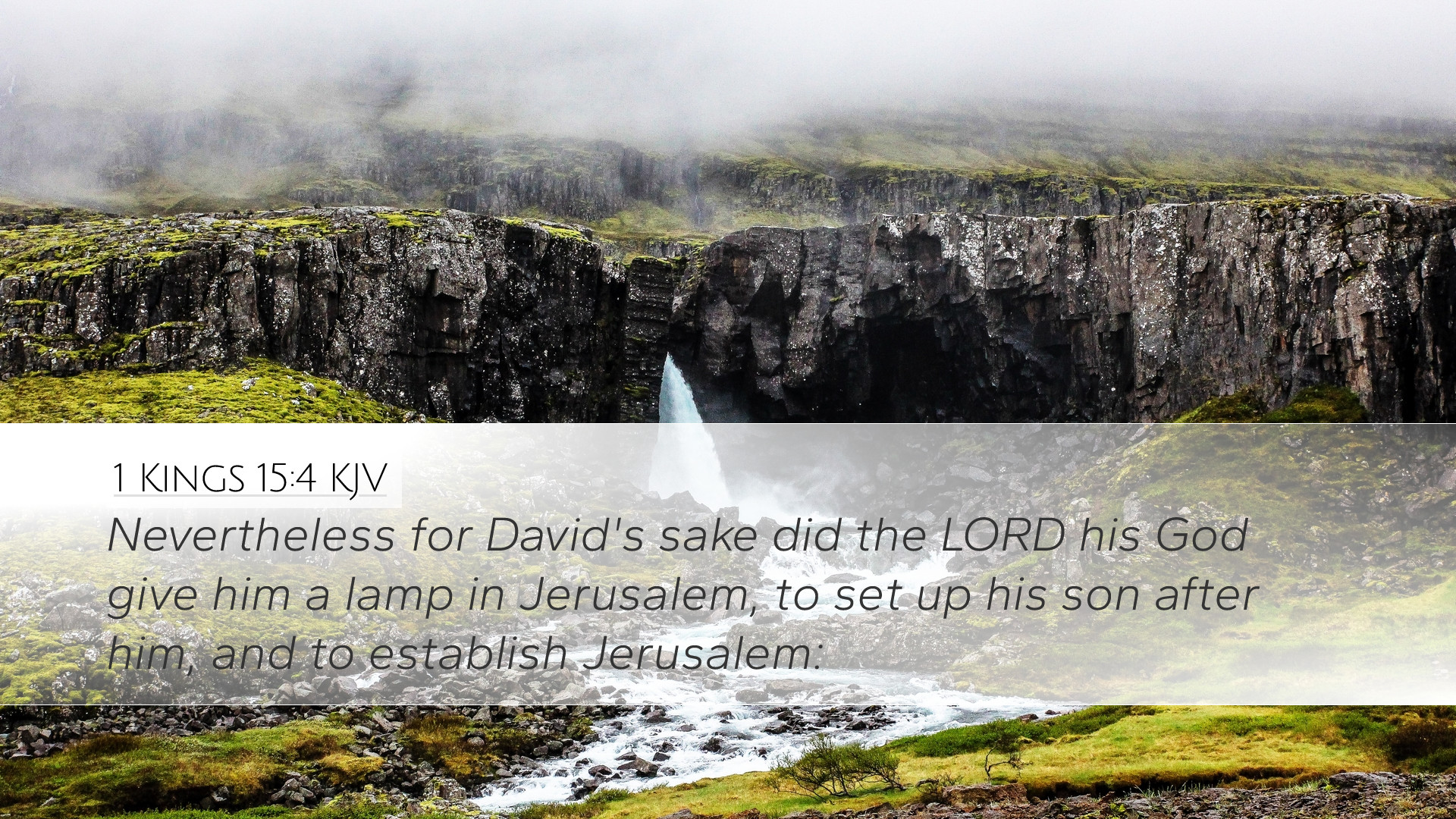Commentary on 1 Kings 15:4
Verse: 1 Kings 15:4 - "Nevertheless for David's sake did the LORD his God give him a lamp in Jerusalem, to set up his son after him, and to establish Jerusalem:"
Introduction
This verse offers profound theological insights regarding God's faithfulness to His promises and His covenant relationship with David. The phrase "for David's sake" emphasizes God's immutability and grace. It also serves as a bridge between the past, present, and future of Israel's kingship and the divine purpose in covenant history.
Divine Fidelity to the Covenant
In the context of 1 Kings 15:4, both Matthew Henry and Albert Barnes highlight God's unwavering faithfulness to the covenant He established with David. This promise included a perpetual lineage and an everlasting kingdom. God's decision to give a "lamp" to David's house signifies the enduring light of His presence and blessing in a tumultuous period for Israel.
-
Matthew Henry:
Henry suggests that the use of the term "lamp" symbolizes not only guidance and life but also the assurance of continuity in David's lineage. The divine promise extends beyond immediate circumstances to the future hopes of the messianic line through Christ.
-
Albert Barnes:
Barnes emphasizes that this "lamp" pertains to the establishment of an enduring kingdom in Jerusalem, which underlines God's commitment to fulfilling His covenant despite human failures. This serves as a reminder that God's purposes ultimately prevail over human disobedience.
The Context of Human Disobedience
The backdrop of this verse reveals a narrative of decline among the kings of Judah, particularly in the reigns preceding Asa. Adam Clarke points out that while the kings often strayed from God's commands, the mention of David signifies a turning point invoked for spiritual restoration. The text implies that despite Israel's unfaithfulness, God remains steadfast to His covenant with David.
-
Adam Clarke:
Clarke elaborates on the leadership of Asa, recognizing that it is through David's legacy that Asa's reign receives legitimacy. Clarke notes that Asa’s faithfulness produces an opportunity for revitalization, indicating how God's mercy remains available even in the face of national decline.
The Significance of the "Lamp"
The metaphor of the "lamp" carries rich connotations. It implies guidance, life, hope, and divine blessing:
-
Spiritual Illumination:
The "lamp" symbolizes God's revelation, nothing less than His promise that David's line would not completely fall into darkness. It serves as an assurance that, even amidst sin and darkness, God’s light will shine through.
-
Hope for the Future:
This verse becomes a beacon of hope for future generations longing for deliverance and restoration. It anticipates the coming of Christ, who is often referred to as the Light of the World, fulfilling the promise made to David's descendants.
Pastoral and Theological Implications
Theological reflection on this verse invites pastors and scholars to draw applications regarding God's faithfulness in their own ministries and personal lives. The assurance found in 1 Kings 15:4 fosters a deeper understanding of God's grace and steadfastness:
-
Pastoral Encouragement:
For leaders grappling with challenges, this verse serves as reassurance that God honors His promises to His people. It encourages faithfulness in ministry, reminding pastors that even through struggles, God is at work establishing His kingdom.
-
Theological Reflection:
The assurance of continuity in God's promises calls for deep reflection on the nature of His grace upon generations. The implications of David’s legacy remind us of the importance of righteous leadership and its impact on the community of faith.
Conclusion
1 Kings 15:4 stands as a testimony to God’s unwavering commitment to His promises despite human shortcomings. It reveals God's character as faithful and true, extending beyond moments of crisis to the grand narrative of redemption. Through the lineage of David, hope is sustained, guiding subsequent generations toward the ultimate fulfillment found in Jesus Christ.


